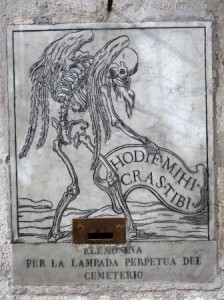 I saw this at Acton Power Blog. It made me put on my Patristiblogger hat for a while:
I saw this at Acton Power Blog. It made me put on my Patristiblogger hat for a while:
Every year the Bureau of Labor Statistics releases the American Time Use Survey (ATUS), which measures the amount of time people spend doing various activities, such as paid work, childcare, volunteering, and socializing.
Here are seven figures you should know from the latest report:
1. On the days they worked, employed men worked 53 minutes more than employed women. This difference partly reflects women’s greater likelihood of working part time. However, even among full-time workers, men worked longer than women–8.3 hours compared with 7.7 hours.
2. On an average day, 83 percent of women and 65 percent of men spent some time doing household activities such as housework, cooking, lawn care, or financial and other household management. On the days they did household activities, women spent an average of 2.6 hours on such activities, while men spent 2.1 hours.
3. Individuals age 75 and over averaged 1.0 hour of reading for personal interest per weekend day and 20 minutes playing games or using a computer for leisure. Conversely, individuals ages 15 to 19 read for an average of 4 minutes per weekend day and spent 52 minutes playing games or using a computer for leisure.
4. Employed adults living in households with no children under age 18 engaged in leisure activities for 4.5 hours per day, about an hour more than employed adults living with a child under age 6.
5. Men were more likely than women to participate in sports, exercise, or recreation on any given day–21 percent compared with 16 percent. On the days that they participated, men also spent more time in these activities than did women–1.9 hours compared with 1.3 hours.
6. Watching TV was the leisure activity that occupied the most time (2.8 hours per day), accounting for more than half of leisure time, on average, for those age 15 and over. Socializing, such as visiting with friends or attending or hosting social events, was the next most common leisure activity, accounting for 43 minutes per day.
7. The average person spend 8.74 hours a day sleeping (8.65 for men; 8.82 for women).
I wonder how much time Catholics spend in prayer.
In Luke 10, Our Lord spoke of the “unum necessarium” during his dialog with Martha.
“Now as they went on their way, he entered a village; and a woman named Martha received him into her house. And she had a sister called Mary, who sat at the Lord’s feet and listened to his teaching. But Martha was distracted with much serving; and she went to him and said, “Lord, do you not care that my sister has left me to serve alone? Tell her then to help me.” But the Lord answered her, “Martha, Martha, you are anxious and troubled about many things; one thing is needful (unum necessarium). Mary has chosen the good portion, which shall not be taken away from her.” (Luke 10: 38-42).
You might also be saying, “But Father! But Father!”, as you reach for your never distant Bible, “What about Ps 27:4?!?”:
“One thing have I asked of the LORD, that will I seek after; that I may dwell in the house of the LORD all the days of my life, to behold the beauty of the LORD, and to inquire in his temple.”
There are any number of places in Scripture where we read about the necessity of a singular focus on God, of placing Him at the very summit of our desires and gratitude.
Down through the ages out greatest writers and thinkers have strained to find the right balance of the active life and the contemplative life.
We live in the tension between the active and contemplative. We feel the tension of the bustle and the desire for calm.
St. Augustine of Hippo often explores this tension in his commentaries on Scripture, usually in homiletic form. At times Augustine presents pair of figures who represent the two dimensions, such as Leah and Rachel, Peter and Paul, Martha and Mary. In his own life Augustine was torn between the heavy burdens of his vocation as a bishop and civic figure and, on the other hand, his desire for quiet and time to contemplate deeper questions. Augustine explains that the two modes of Christian life seem to conflict in this world, while in the next they will be integrated in perfect unity.
Augustine strove to balance the seeming conflict of what he identified as otium and negotium. Otium is “leisure, vacant time, freedom from business”. Negotium is otium‘s opposite: “business, employment, occupation, affair”.
The otium/negotium pair is a topos in classical thought. Take for example a letter of Pliny wherein he nearly shouts: “O dulce otium honestumque ac paene omni negotio pulchrius!” (ep. 19) Just as “peace is not merely the absence of war”, neither is otium simply the absence of pressing business. Otium might be packed with action, but perhaps it may be more interior action than outward physical action.
What Augustine speaks of, however, is establishing otium in negotio, the freedom from care which can be dedicated to contemplation of God and the deeper questions within and in the midst of, united to the performance of the days work and needful tasks.
In simple terms, on can make even laborious tasks, even mind-crushing endlessly repetitive labor, an occasion of contemplation of God.
God is involved in the smallest good performance of our vocations in life.
We must work to be aware of and foster – in a disciplined way- a “God presence” in our actions, in our daily grind.
Allow me to end with a remind of the Four Last Things: Death, Judgment, Heaven and Hell.
The clock is ticking.
You are going to die.
Sort out your priorities.
And, yes, you knew I would get to it: Go to confession.




































For all of us the hour is later than we think.
For me the big question is not “how much time do I spend praying each day?” but “how long has it been since I prayed last?” If the answer is “more than a few minutes,” the chances of my prideful self getting into some sort of spiritual pickle (as I seem to be wont to prove daily, to my sorrow) are too high for my comfort.
Even a moment spent pondering the Passion, the Annunciation, or the Real Presence can head off a spiritual derailment.
It is worth noting that, for the Roman, business (or ‘busyness’) is the negation of ‘otium’. Otium is not the absence of business. The Roman equites looked towards ‘otium cum dignitate’ as the most desirable state, attainable once the cursus honorum (roughly what we in Britain would call ‘public life’) was finished. The idealised picture classical authors give us is of retirement to one’s estates, the cultivation of one’s trees and a large amount of contemplation. Sadly, pagan associations led to an undervaluing of leisure in the Christian dispensation, a kind of ur-Puritanism, which with the professionalization of the contemplative life has led to a general sense that the Faith is for most of us worked out in doing things rather than in simply ‘waiting on the Lord’. Those of us in secular life (and this includes the clergy as much as anyone) need to re-learn how to be still and simply accept the thoughts, sight and sounds of the moment as gifts direct from our heavenly Father.
There was a number of months in which I was financially able to not work, thus allowing me to attend mass every day. Sadly, there were days when I skipped out because I “didn’t feel like going” to Mass. Now that I have to work I realize how much grace I squandered and lost. It’s like I’m being punished.
When I was in the military one of the biggest thrills was reaching a way point ahead of the other groups and opposing forces. It made everything so much easier when I had the advantage of that initiative. When I make the morning Mass before work I get that same rush. I am lined up, I am in order, I have the initiative. I may very well die, but it will be marching in the right direction.
Today I took the opportunity to go to confession, adoration and benediction at a parish on the way to the office before work. About fifty people – young and old alike – participated in adoration.
BTW one of the best things I was ever persuaded to do was a new year’s resolution in 2012 to go to confession at least once in each month. I did so each month that year and have continued each month since. I’m by no means free from sin, but I’m noticeably less likely to go overboard in ways that were customary for me.
There are another couple verses that come to mind with regard to how we use our time.
Philippians 4:8 — “Finally, brothers, whatever is true, whatever is honorable, whatever is just, whatever is pure, whatever is lovely, whatever is gracious, if there is any excellence and if there is anything worthy of praise, think about these things.”
Matthew 6:21 — “For where your treasure is, there also will your heart be.”
It’s slightly out of context to use these verses for modern decisions on how we spend our time, but how much of our thought is wasted on trivialities? How much of our “treasure” do we invest in things designed to simply amuse us with activities devoid of uplifting content?